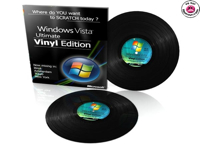Frank has a great post over on Geekwire that does a great job of explaining why Dumbo Drops of tech don’t work in schools.

The question he didn’t completely address is why do people keep making this mistake?
One explanation is that a massive initiative that “attacks” a “problem” is far sexier than a thoughtful program to incrementally improve classroom practice. Don’t forget that many Superintendents are politicians. These things get headlines.
 The Education Business Blog
The Education Business Blog


 Education publishers have taken a lot of fire in the last few years – many believe that we are too big, too powerful, and that things would be better if teachers just wrote their own materials or used free stuff.
Education publishers have taken a lot of fire in the last few years – many believe that we are too big, too powerful, and that things would be better if teachers just wrote their own materials or used free stuff. Quick – what percentage of your iTunes library is produced by amateurs? For that matter how many books on your eReader of choice are self-published works?
Quick – what percentage of your iTunes library is produced by amateurs? For that matter how many books on your eReader of choice are self-published works? My last post,
My last post, 
 The role of textbooks in a rapidly digitizing world is an open question. The publishing industry needs to develop a new paradigm for commercially produced instructional materials or
The role of textbooks in a rapidly digitizing world is an open question. The publishing industry needs to develop a new paradigm for commercially produced instructional materials or What is the best way to break into education publishing? If you are young and starting out what launching pads set you up well for a career in the world of instructional materials and software?
What is the best way to break into education publishing? If you are young and starting out what launching pads set you up well for a career in the world of instructional materials and software? When textbooks go fully digital what will schools buy? Will they buy individual lessons, units of 2-3 weeks length, or full curriculum that span a year the way they do today? This is the $5 billion question facing our industry.
When textbooks go fully digital what will schools buy? Will they buy individual lessons, units of 2-3 weeks length, or full curriculum that span a year the way they do today? This is the $5 billion question facing our industry.